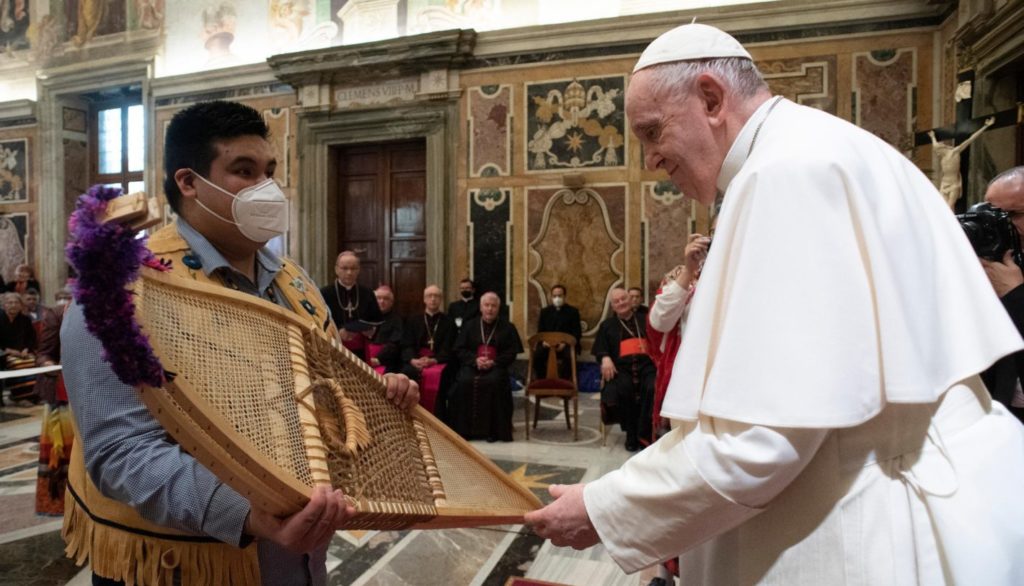I read daily Le Devoira nationalist and secularist newspaper in Montreal. For this medium, which a century ago was nationalist and clerical, the Pope's visit to Quebec in a few days it does not seem to be news. Surely he will change his mind...
Every papal trip is important, but it seems to me that the end-of-month trip to Canada is especially so. The Western anti-religious revolution of the second half of the 1960s hit Canada's proactive Catholic minority very hard. Six decades later, Christianity no longer exists here, in the sense given to it by the French philosopher Chantal Delsol.
Delsol, who recently spoke in Montréal, published in 2021 the essay The end of the Chrétienté. There he affirms that the Christian millennium and a half that is coming to an end in the West was based on dominion. Christianity, which never dies, must invent a new mode of existence: witnessing.
It seems to me that this is what the witness Francisco is coming to. Travel to this existential periphery to be a witness of forgiveness and understanding. He comes at the request of the ninety Canadian bishops. These bishops were pressured by indigenous and indigenist groups who demanded that the Pope personally request forgiveness in Canada by Christian colonialism. This will not be the first time that Francis has spoken out on behalf of the Church, as a poverello of the 21st century.
The relatively low number of indigenous and Métis Canadians (less than two million) shows that for the Church - Francis - Christ - human beings count in themselves. No matter how few they are. The Pope is coming to see them, even if he has to do it in a wheelchair. He is coming from July 24 to 29 to the provinces of Alberta and Quebec and the territory of Nunavut. He is coming to listen, to be with them.
St. John Paul II did something similar during his long tour in September 1984 (meeting with indigenous people in Ontario, for example); and then on September 20, 1987. On that day the Polish pope visited Fort Simpson in the Northwest Territory. He addressed a message to Aboriginal peoples, met with the leaders of four national indigenous organizations, and celebrated Sunday Mass. It was the fulfillment of a promise made three years earlier when fog prevented his plane from landing at Fort Simpson.
Now Francis is also traveling to the far reaches of America. Iqaluit, the capital of Nunavut, has only eight thousand inhabitants. If this territory of the Inuit, which reaches the North Pole, were a country, it would be the 15th largest in the world.
Risks of the visit to Canada
Francisco is a daring man. At 85 years old, he can hardly walk: but he wants to Walking together with the natives (that is the motto of the visit). He is also betting that the natives will be reconciled with an inculturated Jesus Christ, a Christ to whom the indigenists are allergic. The proportion of indigenous Canadian Catholics is probably more than 40 % (that is more or less the percentage of baptized Canadian Catholics). Key fact: the indigenous birth rate (about 2.5 per woman) is higher than the anemic Canadian rate of 1.4.
Francis is betting that his strategy (by divine inspiration, no doubt) of going to the geographical peripheries (appointing electors of the future pope in places far from the big headlines and unknown to the stock exchanges) - that this will re-center the ecclesial global positioning system.
Its strategy is to move away from self-referentiality. From narcissism, from the typical illness of the enclosed Church that looks at itself, bent like the woman of the Gospel, which leads to spiritual worldliness and clericalism, and which prevents us from experiencing "the sweet and comforting joy of evangelizing" (see "Evangelii gaudium", quoting St. Paul VI). Francis wants to get out of the sacristies, kick the boulevards of the metropolis and the alpine, Asian, Amazonian and African trails.
Francis is perhaps betting that his critics - he has them in English-speaking Canada, influenced by a certain North American clerical conservatism - will realize that he is simultaneously progressive and conservative. Or that he is, as Juan Vicente Boo says in The Pope of joyan "intelligent... conservative".
For all this and more, this trip matters. Let's see how it turns out. Stay on your screen.








